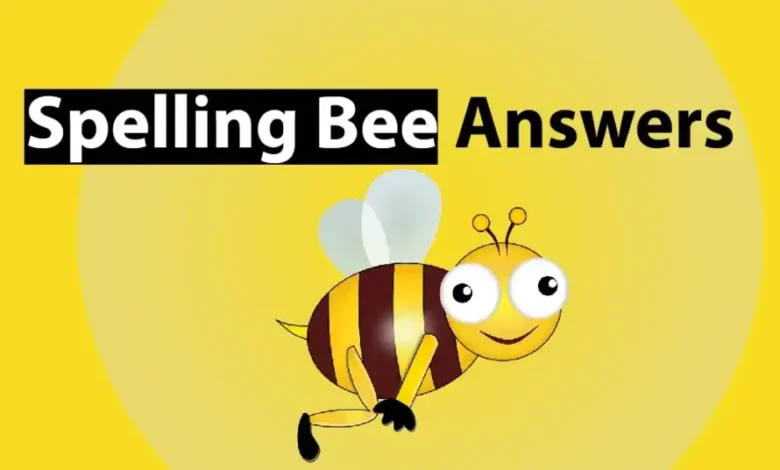Spelling Bee Answers: Mastering the Game of Words

Spelling bees have become a staple of intellectual competitions, testing not just vocabulary but the composure, memory, and confidence of participants. If you’re preparing for a spelling bee or simply interested in learning more about these word battles, this detailed article will serve as your go-to resource. Let’s dive into the world of spelling bees and uncover what makes them such a powerful tool for learning and competition.
What is a Spelling Bee?
A spelling bee is a competition where participants are asked to spell a variety of words. This seemingly simple task requires a deep understanding of vocabulary, phonetics, and even word origins. It’s not just about knowing how to spell; it’s about keeping calm under pressure and recalling the exact spelling of even the most obscure words.
The History of Spelling Bees
Spelling bees have a rich history that dates back to the 19th century. The earliest recorded spelling competitions were held in American schools, with students battling it out to see who could spell the most words correctly. Over time, these competitions grew in popularity, eventually leading to the creation of the prestigious Scripps National Spelling Bee, which began in 1925.
Why Spelling Bees are Popular
Spelling bees have maintained their popularity for generations because they combine entertainment with education. They offer a platform for students to showcase their knowledge, improve their public speaking skills, and build confidence. For audiences, they offer the thrill of watching young spellers tackle complex and tricky words.
How Spelling Bee Competitions Work
General Rules and Format
In a typical spelling bee, participants are given a word by a judge, and they must spell it aloud, letter by letter. They may ask for the word’s definition, its part of speech, or its origin, but they are not allowed to write the word down before spelling it. If they misspell the word, they are eliminated from the competition.
Types of Spelling Bee Rounds
Most spelling bees begin with easier words and progress to more difficult ones as the rounds continue. Some competitions also include vocabulary rounds, where participants must define or choose the correct meaning of a word. The last speller standing is crowned the champion.
Preparing for a Spelling Bee
Preparation is key to success in any spelling bee. It’s not just about memorizing words; it’s about understanding how words are constructed and knowing how to anticipate tricky spellings.
Building a Strong Vocabulary
A solid vocabulary is the foundation of any good speller. To build this, participants often study word lists, read extensively, and play word games that challenge their knowledge.
Understanding Pronunciation and Phonetics
Many words in spelling bees are tricky because they don’t sound the way they are spelled. Phonetics—the study of sounds in language—can help participants decode a word’s spelling by breaking it down into its sounds.
Commonly Misspelled Words
Some words are commonly misspelled because their pronunciations or spellings are deceptive. Words like “embarrass,” “accommodate,” and “rhythm” often trip up spellers because of silent letters or irregular spellings.
Homophones and Confusing Words
Words that sound alike but have different meanings (like “there,” “their,” and “they’re”) are frequent stumbling blocks in spelling bees. Learning to distinguish between them is crucial for success.
Words with Foreign Origins
English borrows heavily from other languages, and words of foreign origin often have unusual spellings. For example, words like “hors d’oeuvre” (from French) or “kamikaze” (from Japanese) can be particularly challenging for participants.

Techniques to Remember Spellings
Mastering spelling requires more than rote memorization. Effective techniques can make it easier to recall tricky words when under pressure.
Breaking Words into Syllables
One of the simplest and most effective ways to spell longer words is to break them into syllables. This technique allows the speller to tackle each part of the word separately, reducing the likelihood of error.
Using Mnemonics
Mnemonics are memory aids that help spellers remember tricky words. For example, to remember how to spell “necessary,” you can think of it as having “one collar and two sleeves,” referring to the single “c” and double “s.”
Studying Word Origins (Etymology)
Knowing where a word comes from can offer clues to its spelling. Many words in English come from Latin or Greek, and understanding these roots can help spellers anticipate their structure.
The Importance of Spelling Bee Answers
Why Accuracy Matters
In a spelling bee, accuracy is everything. A single letter can make the difference between staying in the competition and being eliminated. Spelling bees demand a high level of attention to detail and precision.
How to Stay Calm Under Pressure
Competing in a spelling bee can be nerve-wracking, but learning how to stay calm under pressure is an essential skill. Many successful spellers use breathing techniques, visualization, or positive self-talk to manage their nerves during competitions.
Online Tools and Resources for Spelling Bee Practice
Apps and Websites
There are several apps and websites designed to help spellers practice, including platforms like Spelling Bee Ninja and Vocabulary.com. These tools offer customizable word lists and even simulate real spelling bee competitions.
Word Lists and Spelling Databases
One of the most effective ways to prepare for a spelling bee is by studying comprehensive word lists. The Scripps National Spelling Bee provides a recommended study list called the “Words of the Champions,” which includes words that have been used in past competitions.
Mock Spelling Bee Competitions
Mock competitions allow spellers to practice in a format similar to a real spelling bee. These mock events can help participants get used to the pressure and pace of a live competition.
Famous Spelling Bee Winners and Their Stories
The Scripps National Spelling Bee
The Scripps National Spelling Bee is the most well-known spelling competition in the United States. Every year, it attracts hundreds of participants from all over the country, with some going on to become household names due to their impressive performances.
Memorable Winning Words
Some of the winning words in the Scripps Bee have become famous for their difficulty, including words like “knaidel,” “stichomythia,” and “gesellschaft.” These words represent the highest level of challenge that the competition offers.
Benefits of Participating in a Spelling Bee
Cognitive Benefits
Spelling bees enhance cognitive abilities, such as memory, concentration, and problem-solving. They also improve a participant’s understanding of language structure and increase their vocabulary.
Boosting Confidence and Public Speaking
In addition to academic benefits, spelling bees boost participants’ confidence and public speaking skills. Standing in front of an audience and spelling challenging words requires poise and self-assurance, traits that can benefit participants throughout their lives.
Common Challenges in Spelling Bees
Nerves and Stage Fright
Even the best spellers can be hindered by nerves. Learning to manage stage fright is crucial to performing well in a high-pressure environment like a spelling bee.
Difficult and Rare Words
Some words in spelling bees are so obscure that even experienced spellers may never have encountered them before. In these cases, knowing word origins and being familiar with language patterns can help participants make educated guesses.
Conclusion: Why Spelling Bees Matter in Today’s World
Spelling bees are much more than just word competitions. They help develop valuable skills, such as public speaking, confidence, and cognitive agility. In today’s fast-paced, digital world, where communication is key, spelling bees remind us of the importance of language and precision.
FAQs
How can I improve my spelling quickly?
Reading widely, practicing with word lists, and using apps that focus on spelling can help you improve your spelling skills more quickly.
What are the most challenging words in a spelling bee?
Words of foreign origin, homophones, and words with irregular spellings, like “xylophone” or “onomatopoeia,” are some of the most challenging in spelling bees.
How do judges decide if a word is spelled correctly?
Judges typically refer to an official dictionary to verify whether a word has been spelled correctly. The speller must give each letter in the correct order without adding or omitting any letters.
Are spelling bees only for kids?
No, spelling bees can be for all ages! While many are geared toward younger participants, there are also adult spelling bees that take place around the world.
Can I use online resources during a competition?
No, in official competitions, participants are not allowed to use online resources or any form of assistance while spelling.



